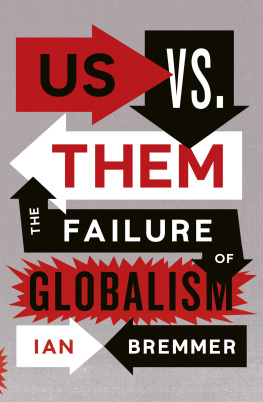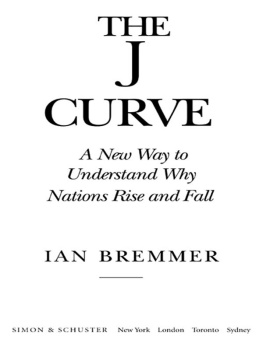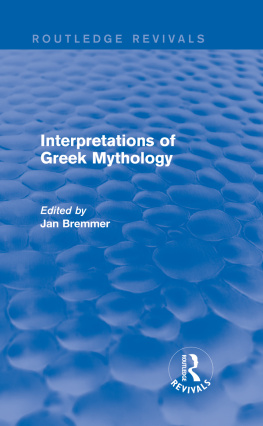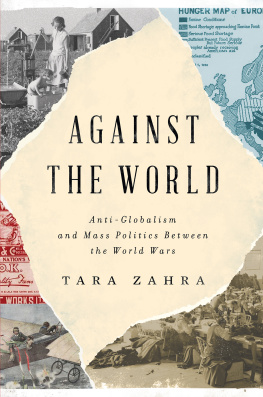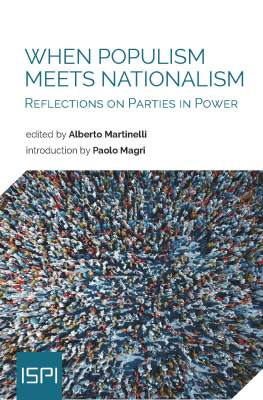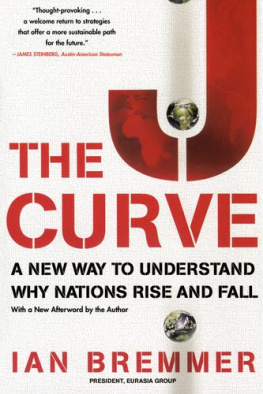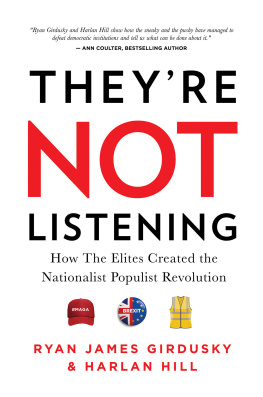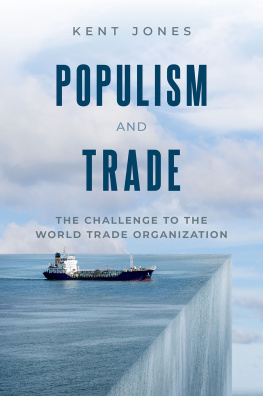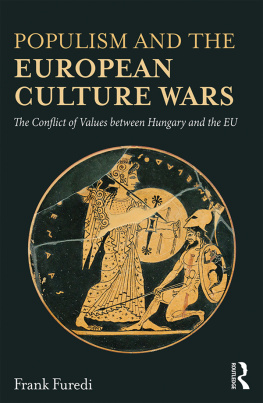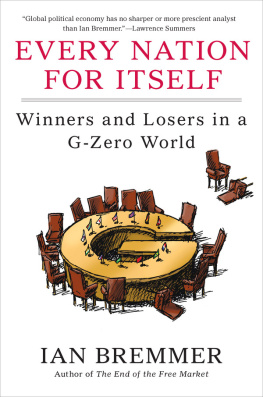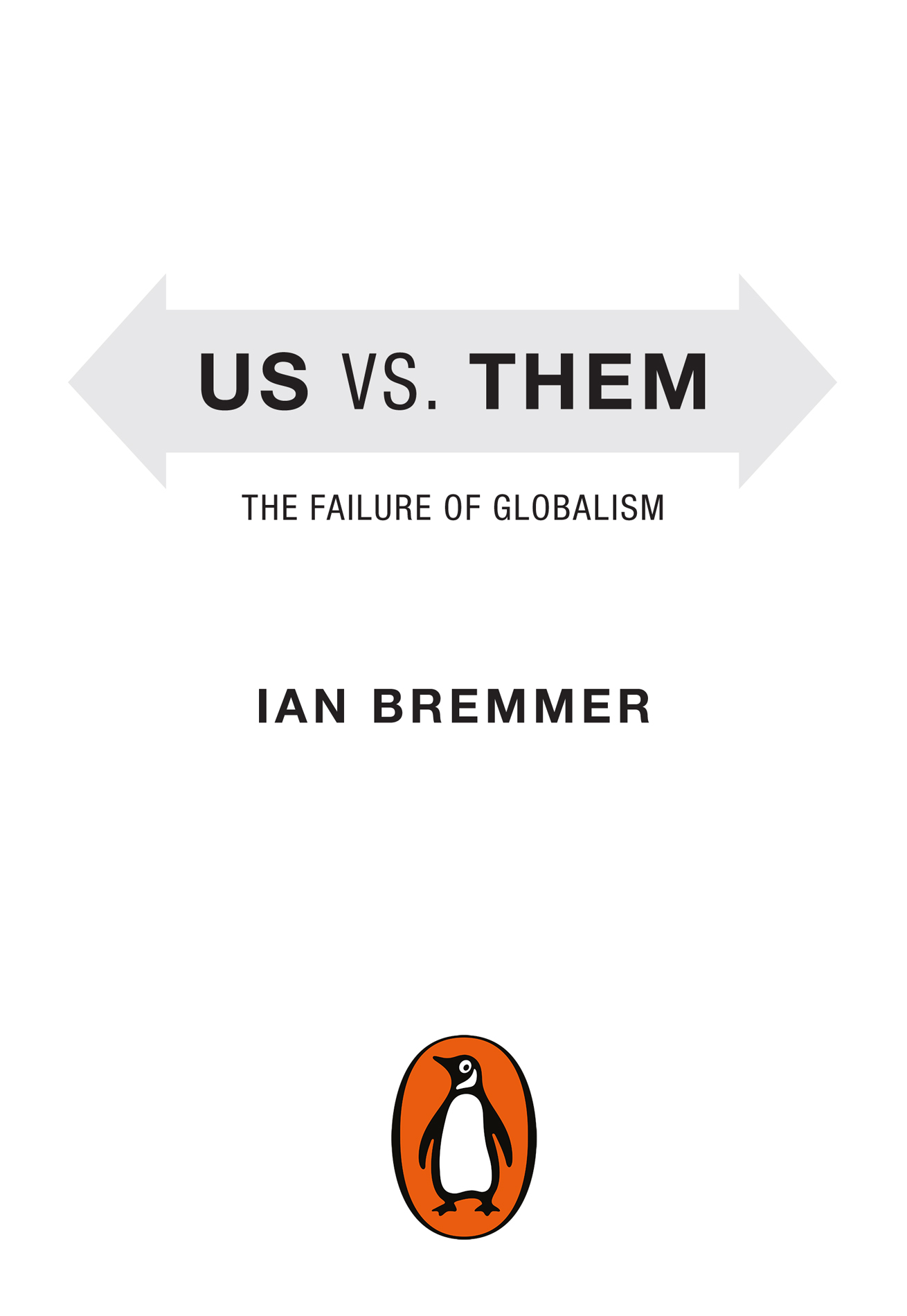ALSO BY IAN BREMMER
Superpower: Three Choices for
Americas Role in the World
Every Nation for Itself:
Winners and Losers in a G-Zero World
The End of the Free Market: Who Wins
the War Between States and Corporations?
The Fat Tail: The Power of Political
Knowledge for Strategic Investing
(with Preston Keat)
The J Curve: A New Way to Understand
Why Nations Rise and Fall
Managing Strategic Surprise: Lessons from
Risk Management and Risk Assessment
(with Paul Bracken and David Gordon)
New States, New Politics:
Building the Post-Soviet Nations
(with Raymond Taras)
Nations and Politics in the
Soviet Successor States
(with Raymond Taras)
Soviet Nationalities Problems
(with Norman Naimark)
US VS. THEM
The best book yet on the waves Donald Trump rode to power. Ian Bremmer is right that rage and scorn are not plans. He provides good practical ideas for what can be done Lawrence Summers, professor at Harvards Kennedy School of Government and former director or the National Economic Council
My favourite thinker on geopolitics offers a masterful analysis of why globalism crashed and populism has soared. This book wont just help you predict the future of nations; it will play a role in shaping that future Adam Grant, author of Give and Take, and Originals and Option B with Sheryl Sandberg
A crisp and compelling anatomy of present political ills across many countries. Bremmers discussion of global approaches to revising the social contract between government and citizen offers a welcome ray of light Anne-Marie Slaughter, president and CEO of New America
Once again, Ian Bremmer provides a striking preview of tomorrows top stories. A timely warning, but also a source of hope, Us vs. Them is required reading for those worried about our worlds future Nouriel Roubini, author of Crisis Economics; professor at New York Universitys Stern School of Business; chairman of Roubini Macro Associates
PORTFOLIO PENGUIN
UK | USA | Canada | Ireland | Australia
India | New Zealand | South Africa
Portfolio Penguin is part of the Penguin Random House group of companies whose addresses can be found at global.penguinrandomhouse.com.
First published in the United States of America by
Portfolio/Penguin, an imprint of Penguin Random House LLC 2018
First published in Great Britain by Portfolio 2018
Copyright Ian Bremmer, 2018
The moral right of the author has been asserted
Cover design: Rachel Willey
ISBN: 978-0-241-98195-5
For Elisa, who cant read this yet
ABOUT THE AUTHOR
IAN BREMMER is the president and founder of Eurasia Group, the leading global political risk research and consulting firm. He has published ten books, including Superpower and the bestsellers The End of the Free Market and Every Nation for Itself. He lectures widely and writes a weekly foreign affairs column for Time magazine, where hes editor at large. He lives in New York City.
Introduction
Why do Palestinians throw rocks? To attract attention? To improve their lives? To make progress toward creation of a Palestinian state? They throw rocks because they want others to see that theyve had enough, that they cant be ignored, and that they can break things. Voting isnt helping them. Outsiders dont care. Where are the opportunities to bring about change? There is nothing left but to throw rocks.
In that sense, there will soon be Palestinians all over the world. Workers everywhere fear lost jobs and wages as a shifting global economy and technological change leave them behind. Citizens fear surging waves of strangers who alter the face and voice of the country they know. They fear terrorists and criminals who kill for reasons no one can understand. They fear that government cannot or will not protect them. Gripped by anxiety, they get angry. To make themselves seen, heard, and felt, they start to throw rocks.
Then the call for help is answered. Donald Trump tells an excited overflow crowd that he sees them, that he sees their enemies, and that only he can take them (back) to the promised land. Senators Elizabeth Warren and Bernie Sanders tell cheering fans that big corporations and Wall Street banks are robbing them blind. Champions of Brexit tell voters they must reclaim Britains borders and reject laws and rules imposed by Europeans. European populists tell followers they will lead the charge of patriots against foreigners and globalists.
These leaders arent arguing that government should be bigger or smaller, that it should tax less or spend more. Theyre challenging the right of elites to make the rules that govern our lives. They tell citizens theyve been cheated of their chance to succeed, and that the media is in on it. They promise to comfort the afflicted, afflict the comfortable, and burn down the houses of power.
We can attack these populists, mock them, or dismiss them, but they know something important about the people theyre talking to, and they understand that many people believe that globalism and globalization have failed them. These would-be leaders have a talent for drawing boundaries between people. They offer a compelling vision of division, of us vs. them, of the worthy citizen fighting for his rights against the entitled or grasping thief. Depending on the country and the moment, them may mean rich people or poor people, foreigners or religious, racial, and ethnic minorities. It can mean supporters of a rival political party or people who live in a different part of the country. It can mean politicians, bankers, or reporters. However applied, its a tried-and-true political tool.
This book is not about the rocks or the damage they do on impact. Rocks are expressions of frustration. They dont solve problems. Instead, we must look more closely at the deeper sources of these frustrations, at how governments around the world are likely to respond to them, and how political leaders, institutions, companies, schools, and citizens can work together to make things better.

There was no wealth where I grew up in Chelsea, Massachusetts, but from my childhood street you could see it in Bostons green and gold skyline. I had no idea what went on inside those towers, but they had my attention. How do you get from here to there, I wondered? When my high school offered a program called Teach a Kid How America Works, I leaped at the chance to join. We junior achievers put on our coats and ties, headed downtown, up the crowded streets, past the men in suits, through the tall glass doors, up the quiet elevator before gliding to a silent stop, waiting, and stepping into the place where the executives worked. I think it was a bank. It had the deepest carpet Id ever seen.
Then we were ushered in for an audience with Tim, a man who seemed genuinely glad to meet us. He had a strong handshake, and he looked at me like he was really looking at me. Would you like to work here? he asked the group. One of us said yes and the rest nodded in agreement. Nobodys stopping you, and dont let anyone tell you otherwise. If you want to be successful, you just have to study hard and work hard. Its totally up to you. He believed it, so I did too.

